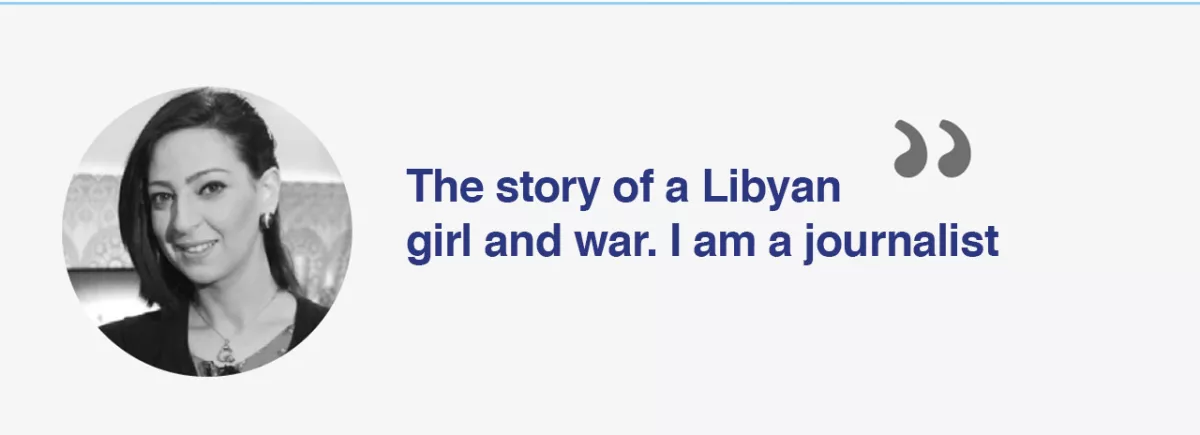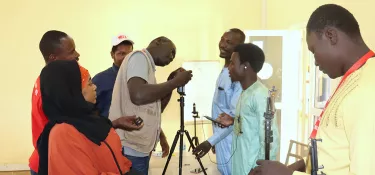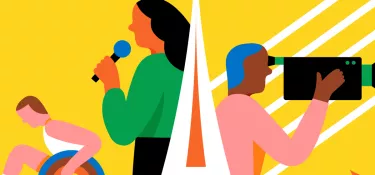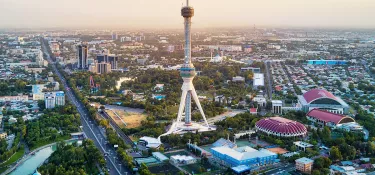
I am a Libyan journalist: Malak Beit Al Mal
Related project
HiwarThe words of Malak Beit Al Mal, journalist at the Al-Ahram foundation in Egypt.
I am Malak Beit Al Mal
I never intended to leave. I was born and grew up there. I spent my childhood there, until I was twenty. I studied at the Law School; I dreamed of becoming a lawyer and defending the rights of Libyan citizens who had suffered injustice, but my dream turned into a job dealing with legal affairs at the power plant.
Everything around me forced me to leave, or rather flee.
I admit it. I fled from the chains that bound me in my country. Normally, people leave the countries they migrate to and go home, where they find safety and stability and reconnect with family, friends and neighbours. But I fled my country to take refuge in the darkness of exile, and I mean darkness because I had no idea where I was going, what my future would hold or what would happen to my family, my father, my mother and my sisters. Most of all, I had no idea what would become of us afterwards.
Libya was the only country I'd ever known. I'd never gone abroad. In fact, I'd never left Hay Al Andalus in Tripoli. My father was a simple clerk. He didn't have the means to pay for his four daughters and their mother to travel. Anyway, he worried so much about us that he watched over us wherever we went. So I made do with family visits and the occasional trip to the beach in Tajura, when my father's finances allowed.
I made do with little and dreamed of getting married, like every Libyan girl (to do the things I dreamed of, such as travel, leave my family and have the life I wanted). I was nearing thirty and still unmarried, partly because of life's money problems; also, I was reaching an age that's seen as quite old to get married in Libya. Mothers always want their sons to marry a beautiful girl in her early twenties. I'm no great beauty. I don't think I'm ugly either, but I think luck hasn't always smiled on me.
The Revolution happened. I lived through every stage of it in the streets of Tripoli. I had mixed feelings: I was a prisoner behind the walls of my home and I felt the fear that crept into all of us in the family, but on the other hand I was happy at the thought that everything would change for the better after Gaddafi. Yes, the Revolution got rid of Gaddafi. That's when the story begins...
I remember the liberation speech given by Councillor Moustafa Abdel Jalil. My four sisters, my mother, my father and I were sitting there, waiting for the moment when the hero Abdel Jalil would appear and deliver the historic speech, to us and the world, that would put an end to eight months of suffering. I couldn't believe what I was hearing: he allowed Libyan men to take four wives, claiming that that was their right under Islam.
That was when I realised that I was a girl in Libya and that my life from now on would be neither simple nor easy.
Events unfolded as if women were the only form of corruption that existed in the country. They took away the legal quota for women in the National Assembly and Parliament, and even in the training programmes for the different Libyan ministries. On top of that came the confusion caused by the law that barred women married to foreigners from passing on Libyan nationality to their children and the scrapping of the law that required men to tell their wives and get their permission before marrying another woman.
Women were turned on in the streets. They were verbally and physically harassed, especially if they weren't wearing a headscarf or hadn't covered up their skin. Sometimes girls would be threatened if they didn't give in to those demands.
And the threats weren't all. It could end in murder. It all started when two girls were raped and killed in Tripoli. Then other things happened too, until the worst crime in Libya's history, which shook the world: when the professor and activist Salwa Bugaighis was cruelly killed by armed men who broke into her home.
It's possible that I wasn't enormously frightened at that point, because the crime took place so far away from Tripoli. But the fear began to grow because there were so many attacks in Tripoli, and children and young women were being kidnapped from their homes. That wasn't why we left, however.
There were two reasons for our departure. One was the attempted kidnapping of my younger sister while she was in her last year at school. Three young men armed with guns on a pick-up truck tried to kidnap her and her friend while they walking home from school.
If our neighbours hadn't been there with guns too, my sister wouldn't be alive today. One of the gang members was killed in the confrontation. Afterwards, they wanted revenge and I know for certain that a lot of blood will be spilt before it all stops.
The second reason was a video that was circulating on social media, which showed an old woman being raped in her own home in Tripoli. It was very moving. She was crying out, "Don't you have women?"
But the attackers carried on regardless. In fact, it just made them even more brutal. I couldn't believe we had reached that stage in Libya: no respect for women, numbed consciences, yet these used to be fundamental values for the Libyan people. Everything collapsed.
In the end, my parents decided they had to leave the country and get away from the sexism, violence and oppression that women were clearly suffering. We will not go back to Libya until it becomes a proper country or goes back to what it used to be, so that we can live there. I don't know where we will go or how we will live, but Libya is dominated by fear and danger, so I'm sure we'll be better off, at least in the short term. You're not safe abroad: that's what we were taught, that was our principle...
But the things that have happened in Libya destroyed everything we thought was safe and Libyan. I only hope that I will be able to go home soon to a country that protects my rights and keeps me safe, because a person without a nation is a person without a history.
In order to sustain democratic debate in Libya, CFI launched Project Hiwar in early 2017 in partnership with the Crisis and Support Centre of the French Ministry of Europe and Foreign Affairs. The project creates a forum for the expression of different points of view on the Libyan press.
One session made up of four workshops was arranged in Tunisia. It was attended by twelve Libyan journalists, who travelled from Libya, Jordan, Turkey, Egypt and Tunisia.
This article forms part of the booklet I am a Libyan journalist, which collects a variety of pieces written by the journalists involved in Project Hiwar.



